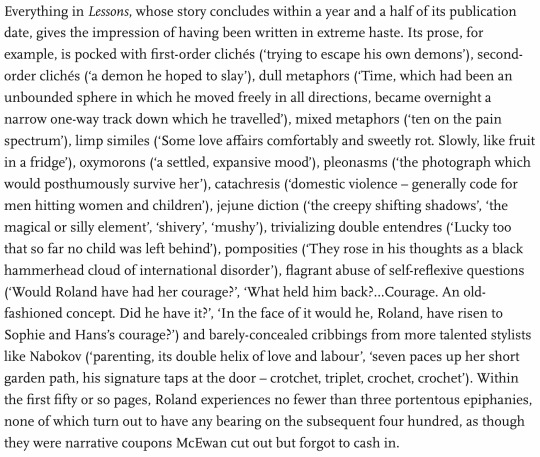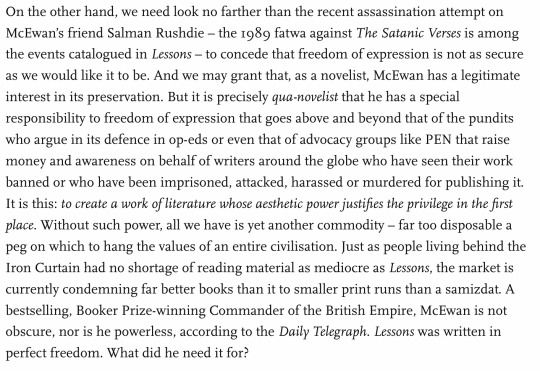#Author: Stuart Dredge
Explore tagged Tumblr posts
Link
#virtual reality#technology#media#google#oculus#theguardian.com#Author: Stuart Dredge#Dredge#Google Daydream#VR#Rift#Oculus Rift#Stanley G Weinbaum#Weinbaum#magic spectacles#Pygmalion’s Spectacles#Lawnmower Man#Kickstarter#crowdfunding#Mark Zuckerberg#Zuckerberg#PlayStation VR#HTC Vive#HTC#Vive#Facebook#YouTube#360-degree#Oculus Ready PC#Alienware
1 note
·
View note
Photo


—Ryan Ruby, “The Pundit”
Everybody’s in ecstasies over this hatchet job on Twitter, so I thought I might offer a corrective objection or two. Please bear in mind that I do not admire the novels of Ian McEwan—I’ve read four and a half—even slightly. I hate to mention this document again, but my doctoral dissertation literally opens with a left-wing critique of McEwan, in this case his post-9/11 day-in-the-life novel Saturday. I’d phrase my criticism differently if wrote it today, but the main point—that McEwan cynically stacks the narrative deck in favor of Bush’s and Blair’s war and of technocratic imperialism at large—still stands. Yet Ruby’s censure of McEwan has more in common with technocratic imperialism than we might think at first.
His catalogue of McEwan’s prose missteps, for instance, overvalues expert correctness at the expense of the intangibles on which novels have always thrived even when composed by the linguistically inartful. No doubt this kind of exercise can be fun—I’ve probably done it myself—lifting this solecism and that infelicity out of a 500-page novel. But it mistakes what novels are for and how they work. In lyric poems, language reacts upon itself. None but the lords of language—Hopkins, Dickinson, Stevens—need apply. In novels, though, language supersedes itself; novels must go beyond language if they are to live at all. Even in the case of someone like Joyce: all those verbal miracles would have been for nothing if they hadn’t built up the Blooms. And the verbal miracles prove in the end less necessary to novelistic creation at its best than a solid, burning, spinning core of ideation.
Such fussiness as picking one maybe-catachresis out of a long book is what led Nabokov, that master of the second rank, to think he was a better novelist than Dostoevsky just because he wrote finer prose. He carved very beautiful little figurines in jade and lapis lazuli, but Dostoevsky built cathedrals into the sky out of splintering rough-chopped logs.
At the end of the essay, also quoted above, Ruby weds his aesthetics to his politics when he argues that novelists should merit the “privilege” (sic) of their freedom by writing works rigorous and experimental enough to have hypothetically earned the author’s martyrdom at the hands of some Soviet-style state or perhaps a freelance assassin suborned by the rulers of Iran. I wonder what other civil liberties we should come to deserve through expert-vetted good behavior? Whereas, John Stuart Mill contended, free speech necessarily includes the right to be wrong, since no one can possibly know all that’s right in advance of experience.
But in Ruby’s drama of freedom earned through aesthetic worth, of freedom as contingent privilege rather than absolute right, who could possibly know if the artist had succeeded but the critic? The critic’s freedom—indeed, the critic’s privilege—is assumed, is never put into question. With a sleight of hand, the critic’s authority is even placed on the same level as the state’s right to apportion justice, a right to which, Ruby distinctly implies, civil liberties will necessarily be subordinate.
If I told you to read The Rebel for an extended commentary on this line of thinking, Ruby would accuse me of irrelevantly dredging up antediluvian anti-communist rhetoric, so take it instead, please, from a source less easily dismissed with such shibboleths:
We went on to discuss Russian literary policy. I said, referring to Lukács, Gábot and Kurella: “You can’t put on an act with people like this.” Brecht: “You might put on an Act but certainly not a whole play. They are, to put it bluntly, enemies of production. Production makes them uncomfortable. You never know where you are with production; production is the unforseeable. You never know what’s going to come out. And they themselves don’t want to produce. They want to play the apparatchik and exercise control over other people. Every one of their criticisms contains a threat.”
—Walter Benjamin, “Conversations with Brecht” (1934)
12 notes
·
View notes
Photo






2,000 Year Old Mosaic From The ‘Floating Palace’ of Caligula Discovered
If stones could speak, the mosaic unveiled recently at an archaeological museum just south of Rome would have quite the tale to tell.
It was crafted in the first century for the deck of one of two spectacularly decorated ships on Lake Nemi that the Emperor Caligula commissioned as floating palaces. Recovered from underwater wreckage in 1895, the mosaic was later lost for decades, only to re-emerge several years ago as a coffee table in the living room of a Manhattan antiques dealer.
“If you look at it from an angle, you can still see traces of a ring from a cup bottom,” said Daniela De Angelis, the director of the Museum of the Roman Ships in Nemi, referring to the piece’s modern use. The mosaic has been installed in the museum next to two other marble fragments salvaged from Caligula’s ships, and was put on display on Thursday.
“For us it’s a great satisfaction today to see the mosaic in this museum,” said Maj. Paolo Salvatori of Italy’s elite art theft squad, whose investigations led to the mosaic’s return. “Bringing back cultural artifacts to their original context” is the ultimate goal of the squad, he said, and the recovery of the mosaic reflected cooperation among the squad, Italy’s cultural authorities and law enforcement in the United States.
Caligula’s rule only lasted from A.D. 37 to 41, but he enthusiastically embraced the trappings of the position, including an opulent residential compound on the Esquiline Hill in Rome, a villa on the southwest shore of Lake Nemi and the two ships.
“They were floating palaces,” whose “aquatic luxury” was likely inspired by a renowned barge used by Antony and Cleopatra on the Nile, said Massimo Osanna, the director general of Italy’s national museums.
Scholars are still unsure whether the ships had a specific purpose, though some have posited that one was used for the worship of the Egyptian goddess Isis. In any case, Caligula didn’t skimp on the ships’ décor, which included mosaics on the walls, intricately inlaid marble floors, decorated fountains and marble columns. Bronze figures decorated the beams, headboards and other wooden parts.
If ancient sources are to be believed, Caligula was a deranged and despotic ruler with a voracious sexual appetite and a vicious streak of cruelty, but modern scholarship has thrown doubt on those accounts.
“There’s a lot of fake news about Caligula,” said Barry Stuart Strauss, a professor of history and classics at Cornell University. “I don’t want to make him out to be a nice guy or something,” he said, because Caligula executed a number of senators, had a sharp tongue and made many enemies. And when Caligula was assassinated in A.D. 41, “it wasn’t difficult to find people who wanted to assassinate him,” Prof. Strauss added. “But we can’t trust the myths.”
With Caligula’s death, the ships were destroyed and sank to the bottom of the lake. Various attempts to raise them over the centuries were unsuccessful, as well as damaging, and the wrecks were repeatedly plundered, Ms. De Angelis said.
In 1895, the antiquarian Eliseo Borghi managed to recover part of the ship’s decorative bounty, including some of the bronze decorations and parts of the marble floor. These items — including the recently returned mosaic, which he had restored using fragments of ancient marble integrated with modern pieces — were sold to museums in Italy and elsewhere in Europe, as well as to private collectors.
The location of the deck mosaic would have likely remained unknown had it not been for the 2013 presentation in New York of a book by an Italian marble expert, Dario Del Bufalo, on the use of red porphyry in imperial art. He happened to show a photograph of the missing mosaic.
“That’s Helen’s table,” Mr. Del Bufalo recalled one of the attendees exclaiming. Helen turned out to be Helen Costantino Fioratti, president of L’Antiquaire and the Connoisseur, a Manhattan fine art and antiques gallery.
Mr. Del Bufalo said Thursday that he had assisted Italy’s art theft squad in identifying Ms. Fioratti’s mosaic as the section of the marble floor restored by Mr. Borghi. The piece was seized by American authorities in 2017 and returned to Italy. Ms. Fioratti said at the time that she and her husband had bought the mosaic in good faith, in the late 1960s, from a member of an aristocratic family.
“She cared a lot about that table,” Mr. Del Bufalo said Thursday. He said that the marble had been seized because Ms. Fioratti could not prove that it had been legally exported to the United States. She was never charged with any crimes in Italy.
Caligula’s ships were finally recovered between 1929 and 1931, after the lake was drained, an enterprise that exemplified “the highest feat of Italian hydraulic engineering,” said Alberto Bertucci, mayor of Nemi, which is arguably better known for its strawberries than its archaeological heritage.
The Nemi museum was specially designed in the 1930s to house the massive ships — which measured roughly 240 feet long and 78 feet wide — as well as other artifacts dredged up at the time, including fragments of mosaics and brass tiles that covered the roof of a structure on one of the ships.
But on the night of May 31, 1944, the ships were destroyed by a fire that scholars believe was deliberately set by vengeful German troops.
“There was little left afterward because the fire was devastating,” said Ms. De Angelis. But some artifacts survived because they had been sent to Rome for safekeeping.
“The fire in the museum was ignited to destroy, and it did not disappoint,” said the Rev. John McManamon, a visiting scholar at the Institute of Nautical Archaeology at Texas A&M University, who has written a book on the ships that is scheduled to be published next year. Father McManamon’s research backed the conclusions of a 1944 investigative commission which found that “in all likelihood, the fire that destroyed the two ships was caused by a deliberate choice on the part of the German soldiers,” he wrote in an email.
Mr. Bertucci said he had initiated discussions with Italy’s Foreign Ministry about demanding compensation from the German government for the destruction of the ships. Any money received would be used to build scale models of the ships and to “return to humanity what was lost,” he said in an interview this week.
“Today is a very important day,” said Ms. De Angelis at the Thursday unveiling. “Visitors to the museum will find a new addition in its natural place, alongside other marble fragments from the ship, as if it had never been away.”
By Elisabetta Povoledo.
#2000 Year Old Mosaic From The ‘Floating Palace’ of Caligula Discovered#roman history#history#history news#archeology#emperor caligula
105 notes
·
View notes
Text
Northern Wolf by Daniel Greene
MWSA Review Pending
Author's Synopsis
A broken man will be forged in the flames of war...
It is late 1862, and the United States has been ripped apart by civil war for over a year with no end in sight. The war is a distant thought to Johannes Wolf, a young German immigrant with a crippled leg keeping him off the muster lists.
Desperately dredging the gutters for recruits, Wolf cons his way into the depleted, demoralized, and poorly run Union army, and is promptly placed in the undesirable F Company of the 13th Michigan Cavalry.
Wolf's company find themselves riding with Custer and the Michigan Brigade on a collision course with master horseman J.E.B. Stuart and the Army of Northern Virginia in a small town in Pennsylvania, called Gettysburg.
Will they stand tall against the knights of the South and prove themselves worthy? Or will they fall beneath screaming bullets and sweeping blades, becoming more bloody fodder for a lost cause?
Format(s) for review: Kindle Only
Review Genre: Fiction—Historical Fiction
Number of Pages: 247
Word Count: 74,000
0 notes
Quote
This is an article that discusses all of the different ways that people discover new music in this modern technological society. The author, Stuart Dredge, says that apps and smartphones are the key. He describes five main areas of music discovery technology, all of which are connected to smartphones/tablets in some way. These five ways…
This is an article that discusses all of the different ways that people discover new music in this modern technological society. The author, Stuart Dredge, says that apps and smartphones are the key. He describes five main areas of music discovery technology, all of which are connected to smartphones/tablets in some way. These five ways…
0 notes
Quote
This is an article that discusses all of the different ways that people discover new music in this modern technological society. The author, Stuart Dredge, says that apps and smartphones are the key. He describes five main areas of music discovery technology, all of which are connected to smartphones/tablets in some way. These five ways…
This is an article that discusses all of the different ways that people discover new music in this modern technological society. The author, Stuart Dredge, says that apps and smartphones are the key. He describes five main areas of music discovery technology, all of which are connected to smartphones/tablets in some way. These five ways…
0 notes
Quote
This is an article that discusses all of the different ways that people discover new music in this modern technological society. The author, Stuart Dredge, says that apps and smartphones are the key. He describes five main areas of music discovery technology, all of which are connected to smartphones/tablets in some way. These five ways…
This is an article that discusses all of the different ways that people discover new music in this modern technological society. The author, Stuart Dredge, says that apps and smartphones are the key. He describes five main areas of music discovery technology, all of which are connected to smartphones/tablets in some way. These five ways…
0 notes
Quote
This is an article that discusses all of the different ways that people discover new music in this modern technological society. The author, Stuart Dredge, says that apps and smartphones are the key. He describes five main areas of music discovery technology, all of which are connected to smartphones/tablets in some way. These five ways…
This is an article that discusses all of the different ways that people discover new music in this modern technological society. The author, Stuart Dredge, says that apps and smartphones are the key. He describes five main areas of music discovery technology, all of which are connected to smartphones/tablets in some way. These five ways…
0 notes
Text
Democrats Hog-Wild on Impeachment
LOS ANGELES (OnlineColumnist.com), Sept. 27, 2019.--Looking for their Nixon-Watergate moment, Democrats finally got the red meat they’ve wanted to impeach 73-year-old President Donald Trump. Ginning up a recently released whistleblower complaint about Trump’s July 25 conversation with Ukrainian President Volodymyr Zelensky asking him to investigate 76-year-old Democratic Party front-runner former Vice President Joe Biden and his 50-year-old son, Hunter, Democrats accused Trump of high crimes and misdemeanors. Churning their talking points on 24/7 cable news, Democrats hope to throw enough mud on Trump to win the 2020 presidential election. When House Speaker Nancy Pelosi (D-Calif.) signaled she would back impeachment proceedings Sept. 24, Democrats jumped for joy, finally getting what Rep. Alexandria Ocasio-Cortez (D-N.Y.) and other like-minded Democrats wanted to impeachment the president, something Pelosi resisted.
Pelosi’s Democrat caucus has been ready to impeach Trump on almost any grounds, talking about the arcane Emolument Clause, or the 1799 Logan Act, both accusing Trump of betraying his country. Pelosi said Trump, in asking Zelensky to probe Biden and his son, betrayed his oath, the Constitution and the rule of law. Pelosi said today she offered Trump and the country her “prayers,” getting too dramatic over the Democrats’ latest attempt to besmirch Trump. Trump was under an FBI counterintelligence investigation while he ran for president, accusing him of inappropriate ties to the Kremlin. Former Secretary of State Hillary Rodham Clinton made the charges in the last presidential debate in Las Vegas, calling Trump a “Putin puppet.” FBI officials used Hillary’s paid opposition research AKA “the dossier,” to build their case against Trump.
Raising the issue of the Bidens’ involvement in Ukraine created denunciations in the Democrat Party and the media. Democrats contend that Trump was trying to interfere with the 2020 election by digging up dirt on Biden and Hunter. Over the Democrat-friendly airwaves, the pro-impeachment crowd has already convicted Trump of high crimes and misdemeanors, plenty for impeachment. No one in the pro-impeachment crowd wants to admit that the Obama’s White House and Hillary’s campaign went to inside Russian sources, namely, former MI6 agent, Christopher Steele, to dredge up dirt on Trump. Former FBI Director James Comey, fired by Trump May 9, 2017, insisted the FBI investigated serious charges against Trump during the 2016 campaign and during the first three years of his presidency. Yet not one Democrat-friendly media cares about the FBI’s discredited probe into Trump.
New revelations about the whistleblower complaint and Trump���s admissions about talking to Zelensky have increased the public’s receptivity to impeachment. Before the whistleblower complaint, the public opposed impeachment 53% to 39%. After the complaint, the public is split 49% favoring, to 46% opposing impeachment, mirroring the Democrats and media’s feeding frenzy backing impeachment. As long as the media tries-and-convicts Trump of high crimes and misdemeanors in the press, pro-impeachment poll numbers will go up. Once Republicans and their attorneys argue that Trump did nothing outlawed in the Constitution or the federal election code, voters’ opinions will change again. Pelosi’s Sept. 24 move to back impeachment sways public opinion, especially among anti-Trump voters. When Republicans push back against Democrats’ in any hearings, public opinion will swing back to Trump.
When Special Counsel Robert Mueller was in full swing with his probe of Trump’s alleged ties to Moscow, Democrats and the anti-Trump press swayed public opinion to toward impeachment or at least expecting negative results from Mueller’s investigation. When Mueller released his final report March 23, Democrats didn’t get the smoking gun they hoped for. For 22-months, Democrats and the press accused Trump of Russian collusion, until Mueller said he found no evidence. Instead of touting Mueller’s credibility for nearly two years, Democrats refused to accept Muller’s findings, cherry picking the report to accuse Trump of obstruction of justice. Once cleared by Mueller, Trump engaged Zelensky, believing that the Russian collusion scandal was behind him. Talking to Zelensky was Trump’s way of saying he was finally cleared of criminal wrongdoing,
Democrats have what looks like a “smoking gun” but could easily backfire once Trump’s attorney’s argue that president did nothing wrong. If there’s no legal basis to Democrats’ complaint, it’s going to make them look foolish to voters. “Polling in the middle of a political hurricane is ridiculous,” political analyst Stuart Rothenberg said yesterday. Democrats hope to capitalize on the mass hysteria now sweeping Capitol Hill. When legal experts get to weigh in raising doubts about Democrats’ indictment of Trump’s phone call to Zelensky, it’s going to make them look like they rushed to judgment. Under pressure from her Party’s left wing, Pelosi was reluctant to pull the trigger on impeachment, largely because it could hurt Democrats. If legal experts agree that Trump did nothing wrong, it could expose Democrats political motives to throw mud before the 2020 election.
About the Author
John M. Curtis writes politically neutral commentary analyzing spin in national and global news. He’s editor of OnlineColumnist.com and author of Dodging The Bullet and Operation Charisma.
0 notes
Text
What stories are yours?
When the long-awaited memoir from Flying Nun record label boss Roger Shepherd came out last winter, I sat on my hands for a bit. On the one hand, it was highly relevant to my doctorate on the everyday lives of South Island rock musicians. On the other hand, the going rate for a new local paperback in New Zealand is forty dollars.

Cover of Flying Nun founder Roger Shepherd’s 2016 memoir
If the reviews were anything to go by, it seemed to be a pleasant, fast, well-written take on Christchurch and Dunedin in the early 1980s. Only one review took issue with the book, and the comments accused the author of being petty or vindictive for personal reasons. That review stood out the most, but for a different reason. It said the book told the “heartbreaking” story of Peter Gutteridge.
youtube
Peter very much alive, doing what he does best in the 1988 video for ‘Buddy’ directed by Stuart Page.
It’s a big word, heartbreaking. It’s hard to read when your heart did feel like it broke in half the day he died. And every time you remember, a little part of it breaks again.
After reading that review of Roger Shepherd’s memoir I sucked it up and bought a brand new copy for $36.99. It was a source of great hope. It was a beautiful chance to spend time with new pieces of Peter that may have not yet existed.
Roger didn’t write much about Peter in the early years of Flying Nun.
youtube
The beautifully simple, yet eminently hypnotic bassline at the heart of The Clean’s ‘Point That Thing Somewhere Else’ was written by Peter at the age of 17
There was one comment that made me smile: Roger wrote that Peter was good-looking, talented and smart.

Photograph of Peter Gutteridge by Terry Moore, date unknown.
The end of the sentence, I liked less. Although Roger hadn’t seen Peter in his later years, there was four pages of anecdotal hearsay about the last weeks of Peter’s life. My tongue tasted black bile. I closed the book.
Anthropologists, ethnographers, sociologists and oral historians all stress the importance of reflection. There are so many places where your personal affections can colour what you are writing. The only way to get around that is to admit your bias and be as honest as you can.
There was an irony in the distaste as I read passages about Peter written by someone who had a lot more of an impact on his life than I did. After all, Roger was the person who made it possible for Peter’s music to be heard by the masses. What is my place in all of this? How could I feel more ownership than Roger Shepherd?
When we played our second show ever at the Crown Hotel in Dunedin in June, I thanked The Biscuits for inviting us on tour, and then thanked Brenda for our name.
“It was easy,” she replied from next to Dave. “Peter Gutteridge.”
Brenda had given us the name “PGX” as a placeholder when booking the tour after liking a song I wrote about Peter.
“I think PGX might stick,” Mary said the morning after our first show.
“The consonants are clack-y,” I agreed.
“P-G-X,” we chanted at the same time. Our eyes lit up. We did it again. P-G-X!
If you took away the context, PGX was fun and ambiguous and vague. It was better than The Expats. Mary hated that name. The consonants were good, but the context killed it – which as Mary put it went: “Hey, want to come see a local gig? We’re not from around here.”
It wasn’t hard to think about Peter when we played The Crown Hotel in Dunedin this winter. I had seen him play there many times. The place is still plastered with Snapper posters. There is a collage dedicated to Peter at the end of the bar.
youtube
Peter Gutteridge doing a guest spot in Chris Heazlewood’s band The Forty Winks at The Crown Hotel in Dunedin in 2012.
I thought maybe finishing our first tour would feel elating. Instead finishing with the song about Peter felt like shooting an arrow into the darkness and striking the black vein that runs through Dunedin. It was like ripping open your heart and holding it out still beating. People cheered, a bit. We thanked them. I was a wreck.
“What were you expecting?” my bandmates pressed.
I wasn’t expecting the black cloud to swallow my heart again three years on as quickly as it did.
When we first played the song back at Jane’s Bar in the Christchurch suburb of Linwood back in March, I said, “This is a song for Peter Gutteridge” and one guy in the back cried, “Yeah.”
I pointed my finger to the back of the bar. “Yes, sir.” I agreed. “That’s right.”
After the show, a woman clasped my hands and said that she knew Peter, and had been sent to the bar that night to hear my song.
In Dunedin, the room is different. Everyone in there has had an experience with Peter. It’s like the song is like, “Hey, remember this guy?” And everyone in the room goes, “Yeah, I do.” Real flat. “Thanks. Thanks for triggering that and dredging it all back up for us.”
Nikolai’s face was like stone in the front row. Erica walked up to me with tears streaming.
Erica and I met seven years back while on tour with the Wellington band Full Moon Fiasco around the South Island. Erica was the VJ; I was there to bear witness.

Erica adjusting the spinning wheel that she used for animations on Full Moon Fiasco’s winter 2010 South Island tour, Chicks Hotel, Dunedin, New Zealand, 20 August 2010.
That was the band that first introduced me to Dunedin as a band would see it, and the tales of Peter that less than six months later transformed into a friendship in a supermarket.
Three months later, Erica and I waded through the tall, wet grass that ran alongside Peter’s house to get close enough to holler through the kitchen window and get him to let us in. Peter wasn’t answering his door again, but that was normal. His house was long and thin.
Peter was home, and he loved Erica, who also performs under the name Lady Lazer Light. Of course he did. Peter stayed with Erica in Wellington years later, after Danny joined the reformed Snapper and they toured the North Island. At one point, Peter took everyone out on an elaborate quest for a pure source of drinking water after the tap water in Wellington did not appeal to him. Erica had last crossed paths with Peter on the streets of Wellington on her birthday a few months before his death. After he handed her a cross as a birthday present and said, “I can’t wear this anymore, but maybe you could,” she worried about him, a bit.
“I’m crying,” was all Erica said.
“Erica!” I wrapped her in a hug.
“I really liked your song.”
“Thank you.” We held each other, my guitar squeezed between us.
I told Nikolai about how the song had come into my head as I watched him play at Peter’s memorial.
He smiled. “Cool.”
We drank pitchers of black Speights until Jones nudged us out at two thirty in the morning.
At our departmental morning tea the following week, Peter Stapleton mentioned that he had seen our set. “You were great!”
“Really?” I smiled. “Thank you. I wasn’t sure how the Peter song would go down.”
“It was mixed,” he admitted. “I knew Peter. I was next to people who played with Peter.”
And who am I? I get it. They have no reason to care for an American talking about one of their friends.
That’s what we will always be, from the first word we speak, Mary and I agreed. American.
“Be careful there,” Winston insisted. “Keep yourself in check. You’re on their turf.”
“Maybe I shouldn’t play the song in Dunedin,” I mused.
“Oh no, you have to play it,” Winston said. “Always play it. That’s your tribute. Just don’t expect everyone to feel the same way that you do about it.”
Earlier this week the police’s version of the story was released as the inquest into Peter’s death in state care began.
This is a sick and twisted world, I thought at the grand photo of Peter below the district court where the inquest was taking place.

Phantom Billstickers poster of Peter Gutteridge photographed by Hayley Theyers, in the car park below Albert Street in Auckland, New Zealand, August 2017. And a little bit of Stuart Page, one of Peter’s best friends, in the lower left hand corner.
The lines between memory and myth are fuzzier than most people realise. What constitutes honesty when the same thing can be seen as either loyalty or clouding allegiance? Where does that boundary lie in a community that tells its own stories to itself a hundred times before they leave the islands?
Less than three hours after listening to Pure in a backyard in Grey Lynn I was back in Christchurch, heading to the darkroom. Our band originally had a gig, but when Mary and I ended up being the only members in town, we decided to turn it into an open mic night instead.
Ray’s girlfriend Amy had stacked the audience with classmates of hers from NASDA – song and dance theatre students with an average age of about 20. Her theatre background also made her feedback on our performances interesting. Before our Battle of the Bands heat, she talked about entering songs with presence, as an actor would assume a role they were to perform at the theatre.
“Before you sing a song, think: What do I want to achieve here?” Amy said. “Are you just singing a song, or are you channeling the feelings that you had when you wrote it?”
We only had to play 15 minutes to break the ice. The original plan was to do one or two of our own songs, but also set the tone by returning to some of our first covers.
youtube
Who doesn’t subconsciously know how to sing the chorus of Poison’s ‘Every Rose Has Its Thorn’, amirite?
But we hadn’t played those in years. I had forgotten the date the inquest began and raced off earlier in the week, leaving us no time to practice.
“What if we just did our songs?” I asked with minutes to go. “We’ve played them so many more times. We know those.”
Mary held up a few fingers. “Flowers. Merchant...”
“Let’s do Peter,” I said.
“I wasn’t sure if it was too soon...” Mary said hesitantly.
“No.” My stare was like ice. “I can do it.”
“All right,” I said after we rambled through a few songs last night. “This last one is for Peter Gutteridge. I don’t know if that name is familiar to any of you.”
No one said a word.
They listened politely.
We let it roar.
#new zealand#south island#christchurch#dunedin#flying nun#peter gutteridge#music#full moon fiasco#elan vital#lady lazer light
0 notes